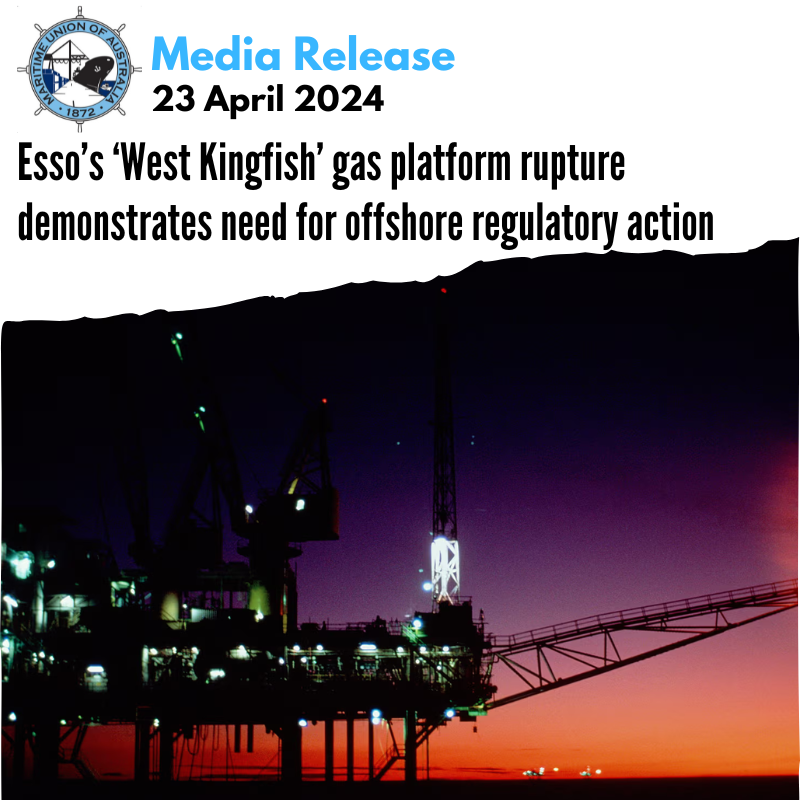
MARITIME UNION OF AUSTRALIA
MEDIA RELEASE
Esso’s ‘West Kingfish’ gas platform rupture demonstrates need for offshore regulatory action
23 April 2024
Key Facts
- Esso/Exxon Kingfish West gas platform in Gippsland Basin suffered a pipeline rupture at 1pm on April 6, 2024 with a sizable ‘sheen’ observed on the ocean surface, heading west towards the Victorian coast.
- This is the latest of a growing number of offshore decommissioning incidents and near misses.
- Tighter regulations, enforcement, penalties and transparency are needed.
- Esso is currently applying to use the Gippsland Basin for sea dumping carbon capture and storage (CCS), this incident raises serious questions as to their infrastructure safety and capacity.
On Saturday April 6, 2024 oil and gas producer Esso, a subsidiary of ExxonMobil, reported a gas pipeline rupture at one of their ageing offshore rigs being decommissioning in the Gippsland Basin off the Victorian coast.
The result was an uncontrolled release of condensate – a mix of hydrocarbons present in the extraction of natural gas – into the water. With barely any information provided, it’s unclear how close this flammable discharge came to being ignited, however offshore regulator NOPSEMA’s recent safety alert warns oil and gas workers that the loss of containment in a subsea gas pipeline has the real threat of resulting in fire and explosion at the surface.
This incident comes off the back of the emergency evacuation last November of yet another Esso rig being decommissioned – where a lack of contingency planning for the very likely scenario of an unserviceable helicopter landing deck saw 30 workers forced to cling to a basket (or Billy Pugh) being precariously craned aboard a support vessel.
The West Kingfish platform is currently under three separate enforcement directions from NOPSEMA. One of these has compelled an independent review into Esso’s ability to ensure a safe workplace after a fire injured a worker on its neighbouring platform – the Kingfish B.
A 2021 NOPSEMA investigation found that “members of the workforce felt unable to convey their concerns about the work and were worried that their job would be at risk if they spoke up”.
An application from Esso is currently being considered by the regulator and the federal government to abandon and dump eight decommissioned steel platforms in the Gippsland Basin including the West Kingfish. This is in addition to an Esso and Woodside joint venture currently seeking EPBC Act referral and approval to start a South East Carbon Capture and Storage (CCS) project in Commonwealth waters.
“As proponents line up to obtain licences for novel technology to store CO2 under the ocean, it has never been more critical to ensure industry operates in a transparent way, to the highest safety and environmental standards,” said Jamie Newlyn, the MUA’s Assistant National Secretary.
“Esso’s years of inaction on maintenance have produced fields of rusting death traps. NOPSEMA’s track record of no prosecutions, acceptance of inadequate safety cases, paired with the industry’s culture of silencing workforce reporting are a perfect storm for both workers and our oceans as decommissioning work intensifies,” Newlyn said.
“While investigation into this latest incident is welcome, how many times will the notices and warnings be ignored before the next disaster takes lives? The time is long overdue for NOPSEMA to serve out compliance measures for those operators who rely on taking shortcuts to expand their profitability. We call for the regulator to throw the book at offenders who systematically breach safety legislation and prosecute them to the full extent of the law,” said the Maritime Union’s Victoria Branch Secretary, Robert Lumsden.
“Despite much of this vast infrastructure being out of sight under the ocean, we know that Esso and other companies operate fields well beyond their expected life span, because they can. Now the consequences are too big to hide, Australian’s deserve their workplaces to be as safe as possible and a coastline free of debris and pollution. A proportionate response to Esso’s belligerence by the regulator is needed to drive compliance, and potentially influence the broader industry to tow line,” Lumsden said.
The MUA has made various submissions to legislative review processes presently underway, including to the review of the Offshore Petroleum and Greenhouse Gas Storage Act 2006¸which lacks harmonised safety standards and allows workers who highlight safety concerns to be discriminated against.
“All workers deserve to come home from work safely. We know this is best achieved in a work health and safety system where workers have a strong voice in how work is carried out, are employed on a permanent basis, and have the support of a strong union so they can speak up without fear of losing their job,” Jamie Newlyn said.
Over the years oil and gas companies have influenced Australian governments to remove aspects of the national Work Health and Safety framework and maritime safety qualifications and standards from offshore oil and gas facilities in the name of productivity and profitability.
A resolution of the MUA’s Quadrennial National Conference, held in Adelaide in February 2024, states that, “The MUA calls for full harmonisation of offshore safety with national WHS provisions, including rights for workers to get support from a union official in their workplace, a mechanism for ongoing harmonisation as national WHS laws are reviewed and updated, and responsibility for WHS matters to be transferred to the same Minister who deals with WHS across other industries”








